BLOG ARTICLE
What are podcast show notes and why you need them
Last updated: 10/22/2024
Last updated: 10/22/2024
Many podcasters consider their task done, once they have finished recording, editing and publishing the episode. They, then, quietly move on to the next episode.
However, in this process, they miss out on one crucial step: writing and optimizing show notes for their podcast.
Show notes are like a map to your episodes. It helps people navigate, discover and connect with your show. Without writing show notes for your podcast, you can end up with just passive listeners who do not get engaged with your content products and will less likely subscribe to your podcast.
In this blog, we’re going to share with you what are podcast show notes, why are podcast show notes super important, also some show notes templates which you can copy and how you can write show notes in just a few minutes.
So let’s dive in!
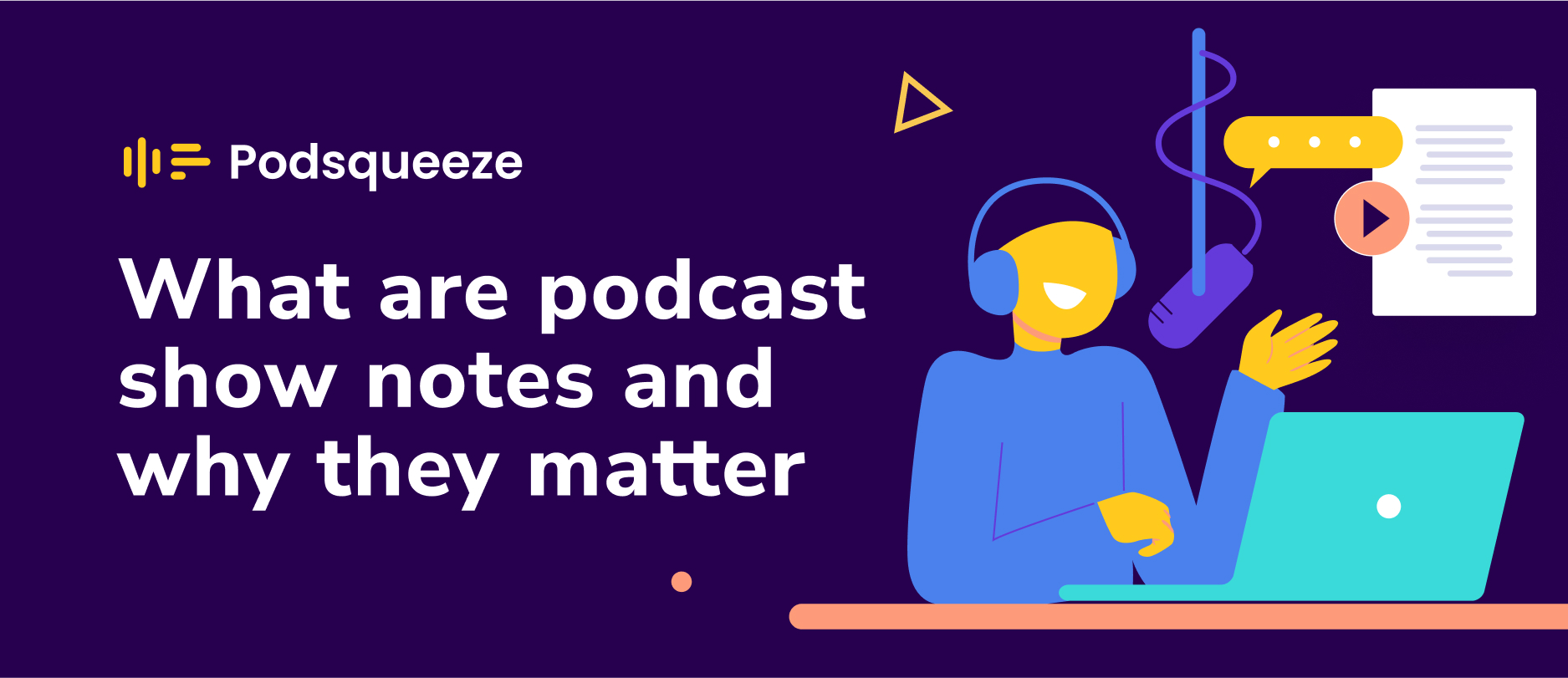
What are Podcast Show Notes
Podcast show notes are a written page about your podcast episode, designed to give listeners a quick glance of the content and keep them engaged.
Podcast show notes serve as a companion to the listeners & provide an overview of the episode including highlights of the episode, key points in it, timestamps, transcripts, links to resources mentioned in the episode & Click-To-Action’s (CTA´s) to plug your sponsorships or promote your products.
Usually podcast show notes are published on your podcast website, either as blog post or an individual page, right below the episode’s player. In addition to the website they can also be posted in the episode description section of podcast directories.
Compared to show notes in podcast directories, which usually come with character limits, publishing show notes on a website has no character restrictions. You can freely add content, without any limitations and include full transcripts, clickable links for users to purchase your products or subscribe to your podcast.
Anyway, enough with the theory. Let’s take a quick dive to see some real life examples of podcast show notes.
1. “How To Fail With Elizabeth Day” Podcast (Short form show notes)
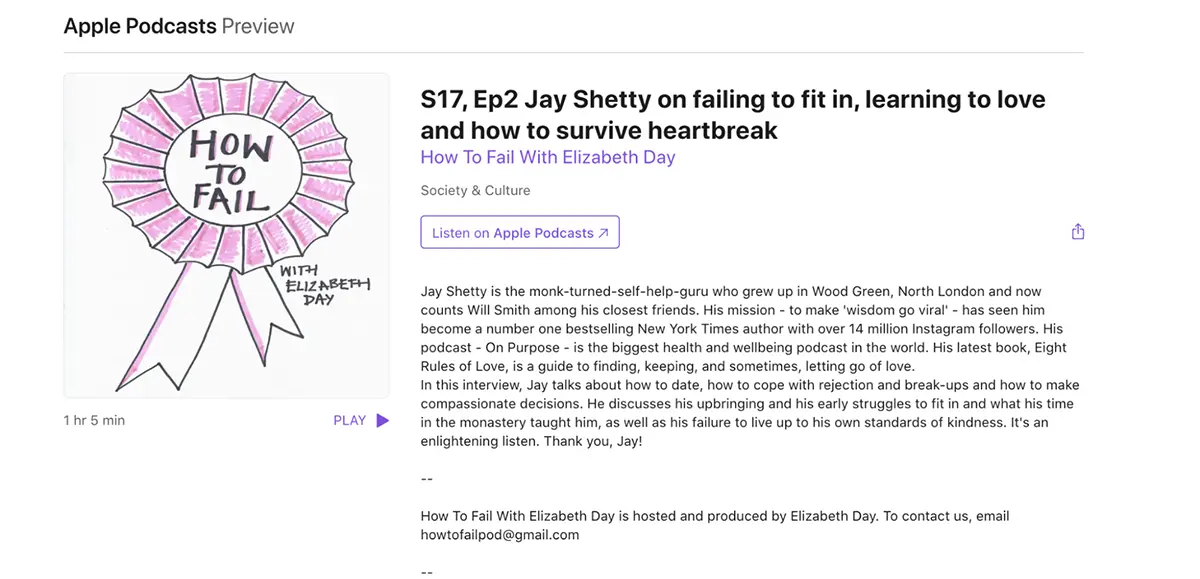
This is a prime example of concise show notes found on podcast directories, consisting solely of a podcast summary. These summaries offer listeners a quick overview of what to expect in the episode. In this particular one, you'll find a brief introduction to the guest, their accomplishments, and compelling reasons to tune in.
It's important to note that podcast summaries should not be mistaken for comprehensive show notes. While summaries are the most concise form, show notes can include a variety of additional elements, as we'll see next.
2. “Social Pros” Podcast (Show notes with hooks + CTA)
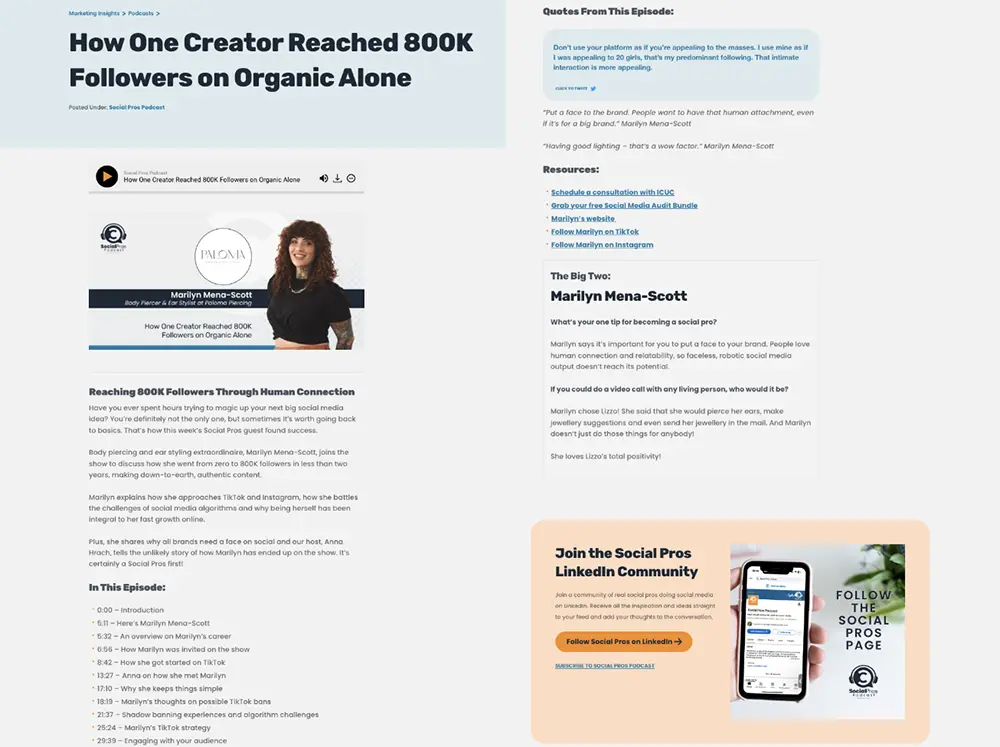
Unlike the previous example, this show notes page is from a podcast’s website that strikes a good balance between being too short & too lengthy. It has a catchy hook at the start to get users curious, timestamps that let users jump to their favorite part, shareable quotes from the podcast & a CTA in the end to get users to follow on social media.
3. “Sound Bites” Podcast (Show notes with Transcripts)
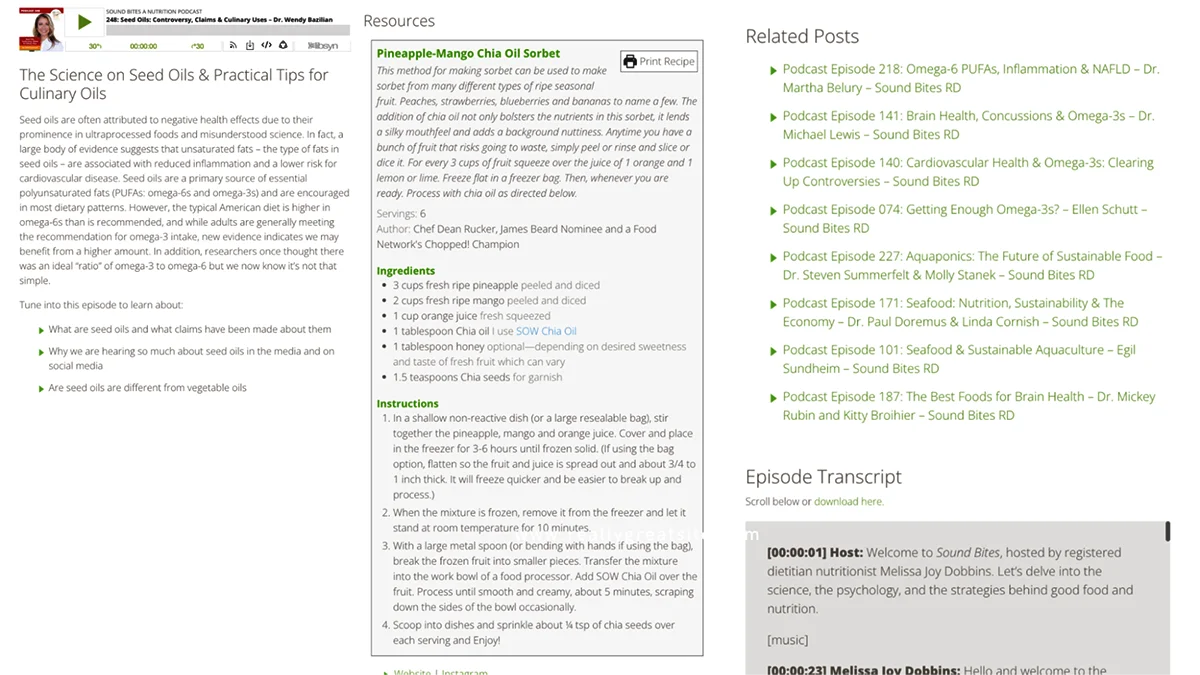
Lengthy show notes like this one can be too-consuming to write manually, but they can give great results for your SEO. Right from the title of the podcast to episode transcript, all these subsections are well organized including relevant keywords to help search engines better grasp your content and rank you higher.
Want to learn how to create the perfect show notes for your podcast? Take a look at this article, with five show notes templates to help you create your own.
Benefits of Podcast Show Notes
Now let's dive into 5 benefits that come with publishing great show notes:
- Improved audience engagement
- Better Search Engine Optimization
- Increased accessibility
- Monetization opportunities
- Establish your brand
1. Improved audience engagement
Podcast show notes can significantly improve engagement of your listeners & encourage them to take action by providing additional information & resources related to your podcast’s topic.
Some of the sections you can add in your show notes to improve engagement include:
- Podcast Timestamps
Provide timestamps for the different segments / topics discussed on your podcast. This will let users jump to their favorite part of the podcast & improve their engagement. You can generate timestamps for your podcast in a click with a podcast chapters generator.
- Links to resources mentioned on your podcast
Include links to articles, books, websites, and other resources mentioned in the episode. This makes it easy for your audience to access additional information related to the discussion.
- Call to action
Show notes are the primary way your audience interacts with your podcast & they are not complete without adding a call-to-action (CTA). A CTA is where you tell your listeners what they should do after hearing your episode.
For example, you can include links to blog posts or other content related to your podcast episode. This can help to drive traffic to your website and encourage your listeners to engage with your work beyond just the podcast episode itself.
Other CTA you can add to your show notes include asking the audience to subscribe to your newsletter, to donate to your podcast or to subscribe to your products/services.
Here’s an example of a Call-To-Action used by a writing coach:
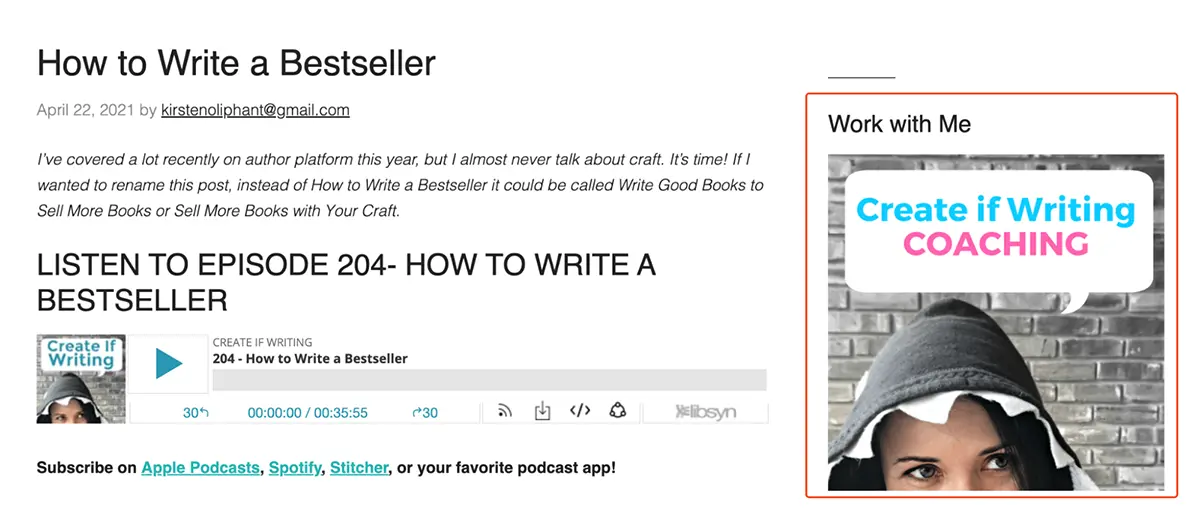
Effective show notes CTAs tend to have the following qualities:
Use action words - Be clear in what action you want the audience to take. And use action words like “buy”, “download” , “start” in your CTA
Ex: Start Your 7-Day Free Trial Now
Make it Visually Stand Out - Use contrasting colors, larger font sizes, or bold text to make the CTA button or link stand out on the page. This will help capture your visitor’s attention
Leverage FOMO & Sense of Urgency - Offer limited time deals or exclusive offers to your listeners in your CTA which motivates them to take action immediately without delay.
Ex: The 50% Off on Marketing Mastery Ends on 30 November. Don't Miss Out!
2. Better Search Engine Optimization for your podcast (SEO)
It is difficult for search engines like Google to understand & index content that is in audio format. By including keywords and phrases related to your episode's topic in your shownotes, you can make it easier for search engines to understand what your episode is about and rank higher in search results. This is particularly relevant considering 73% of podcast listeners said that they used search engines to discover new podcasts, according to a study by Edison Research.
Shownotes will also allow you to gather insights like which episodes and keywords are the most popular and which links are clicked on the most, using tools such as Google Analytics to track the behavior of your podcast listeners.
Once you publish your show notes on your website it is good practice to make some optimizations for search engines that help you increase the chances of ranking higher.
- Mention keywords in URL: Search engines like Google begin to identify the content of your podcast from the URL of your website's page. By adding relevant keywords to your show notes´ URL you can boost its visibility in search. Typically it is a good practice to match the URL to your title, including the same relevant keyword in both.
- Title tag using optimized keywords: The title of your page is one of the primary ranking factors used by Google to rank your website. So when you write the title of your podcast’s show notes, include the main keywords of your podcast in the title & avoid keyword stuffing.
- Add “Alt Text” to Your Images: To get your podcast discoverable on Google Images you need to add images in your podcast with “alt text”. “Alt text” makes sure search engines understand the context of your images & also makes it accessible for those with visual challenges.
- Transcribe your podcast: To target all the relevant keywords discussed on your podcast & let search engines fully understand the context of your episode, it is a good practice to transcribe your podcast. You can use a service like podcast transcript generator to create your transcript in a single click.
- Internal link to other show notes pages: Include links to show notes pages of other episodes that share a common topic or feature the same guest. Internal linking helps search engines like google understand your website’s structure and pass the authority to your website.
To learn how to implement podcast SEO & get more listeners from google, check out this in-depth podcast SEO guide
3. Increased Accessibility
Show notes make your podcast more accessible to listeners. Not everyone has the time or ability to listen to an entire episode, but they might still be interested in the content. By providing a summary of your episode's key points & adding chapters with timestamps in your show notes, listeners can quickly scan through your podcast and get the information they need without having to listen to the entire episode.
Show notes also enhance accessibility in the following ways:
- Impaired Listeners: Including a transcript of your podcast's content in the show notes makes your audio content accessible to individuals with hearing impairments.
- Language Translation: Show notes ans transcripts can be easier translated into different languages, which makes your podcast accessible to a more diverse audience around the world, including non-native English speakers.
- Consistent structure: Well-structured show notes that include headings, subheadings, and “alt text” for images can be read by screen reader software, making the content accessible to visually impaired individuals.
4. Monetization Opportunities
Podcast show notes provide numerous opportunities for you to monetize your podcast.
These include:
- Linking to affiliate products
You can add affiliate links to products you recommend in your show notes section & ask your listeners to buy from them (check example bellow). By doing this, you will get a commission whenever a listener buys using your link.
Example:
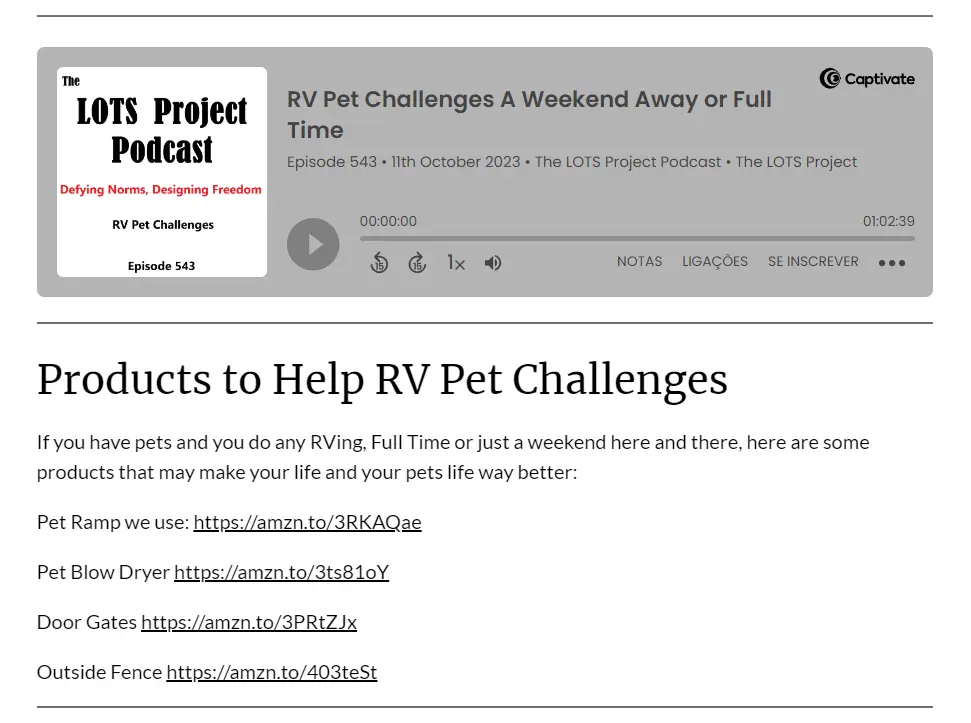
- Promote your own products & services
It has never been easier to build your own digital product. Create a course, checklist or workbook that solves your audience’s problem & promote it in your podcast show notes.
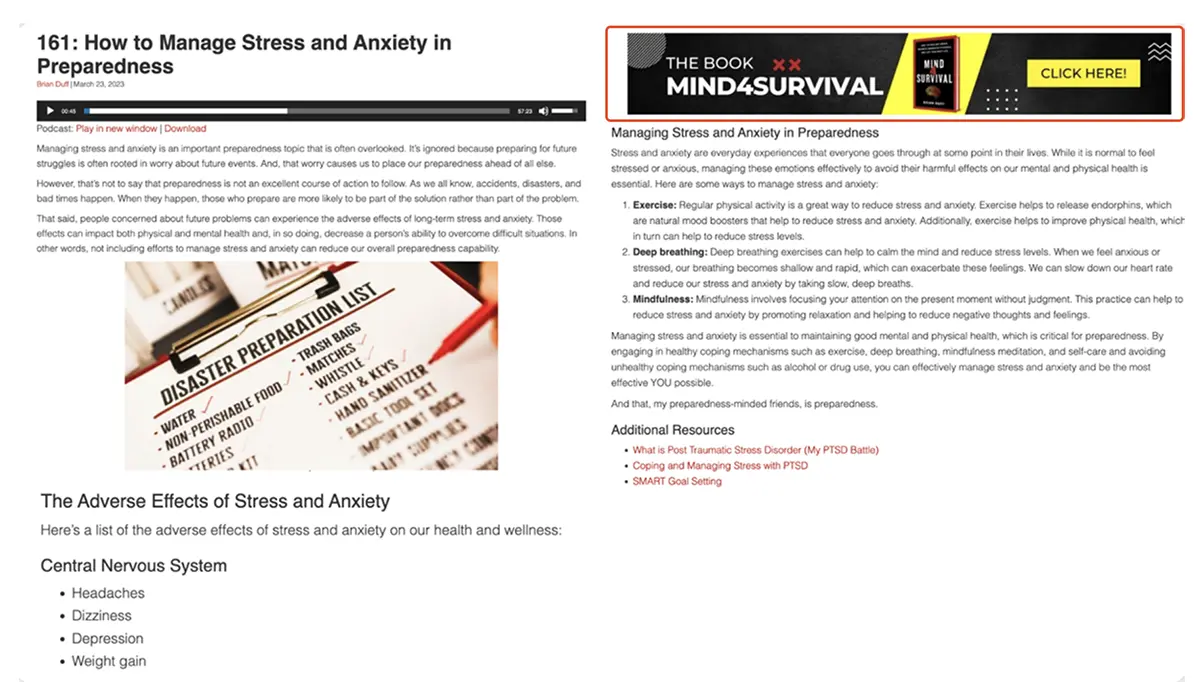
- Get potential leads & clients
Your podcast listeners are very likely to be your target customers. Add a newsletter form or pop-up on your podcast show notes page to get them to sign up for your newsletter & then reach out to touch base with them.
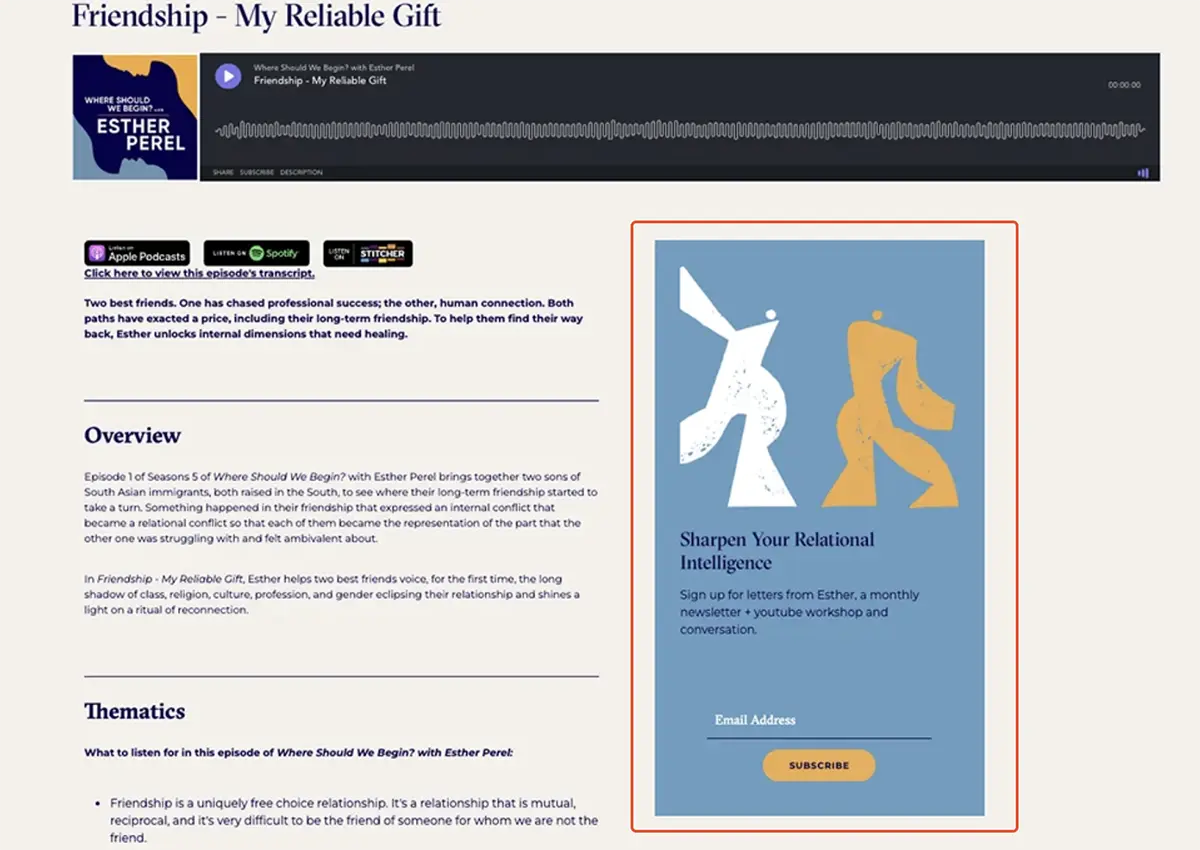
- Offering sponsored content
If you are doing podcast sponsorships, you can negotiate higher sponsorship revenue by offering a dedicated section to your sponsor in the show notes page.
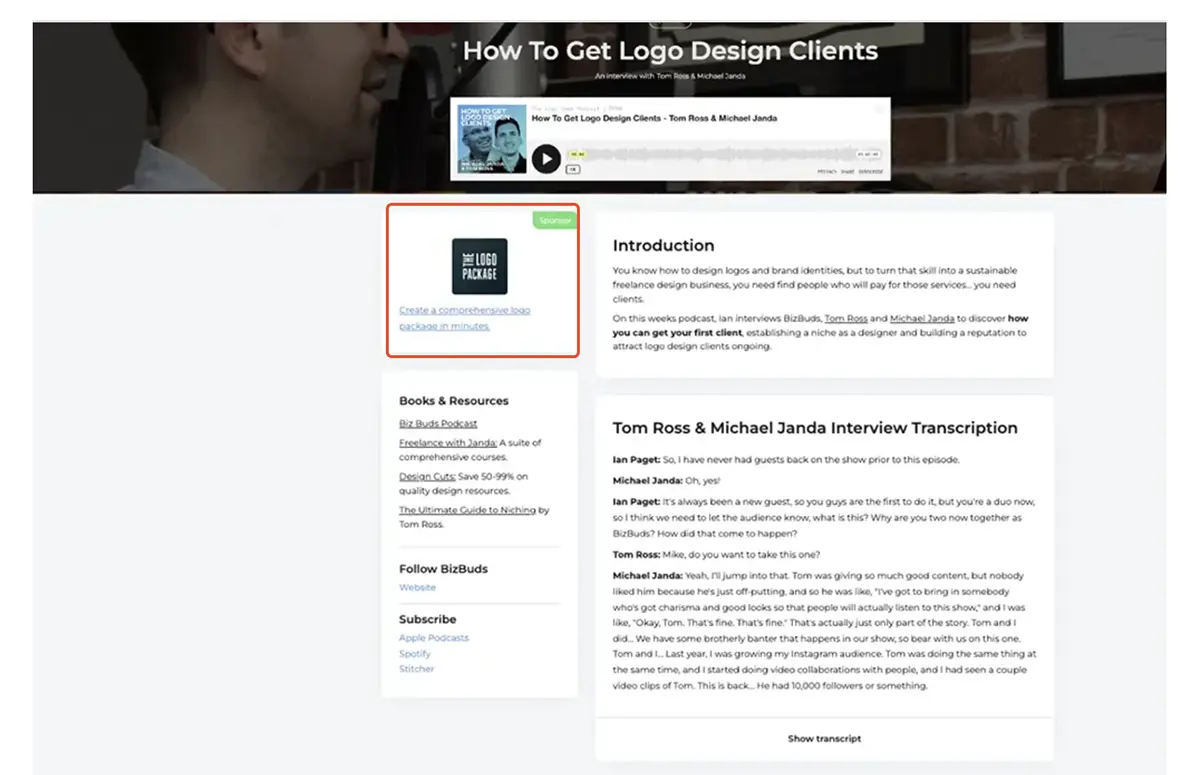
- Selling Podcast Merch
Selling podcast merch is a great way to advertise your podcast & drum up excitement. You can offer to sell printed T-shirts, cups or hoodies that relates to your audience, on your show notes page.
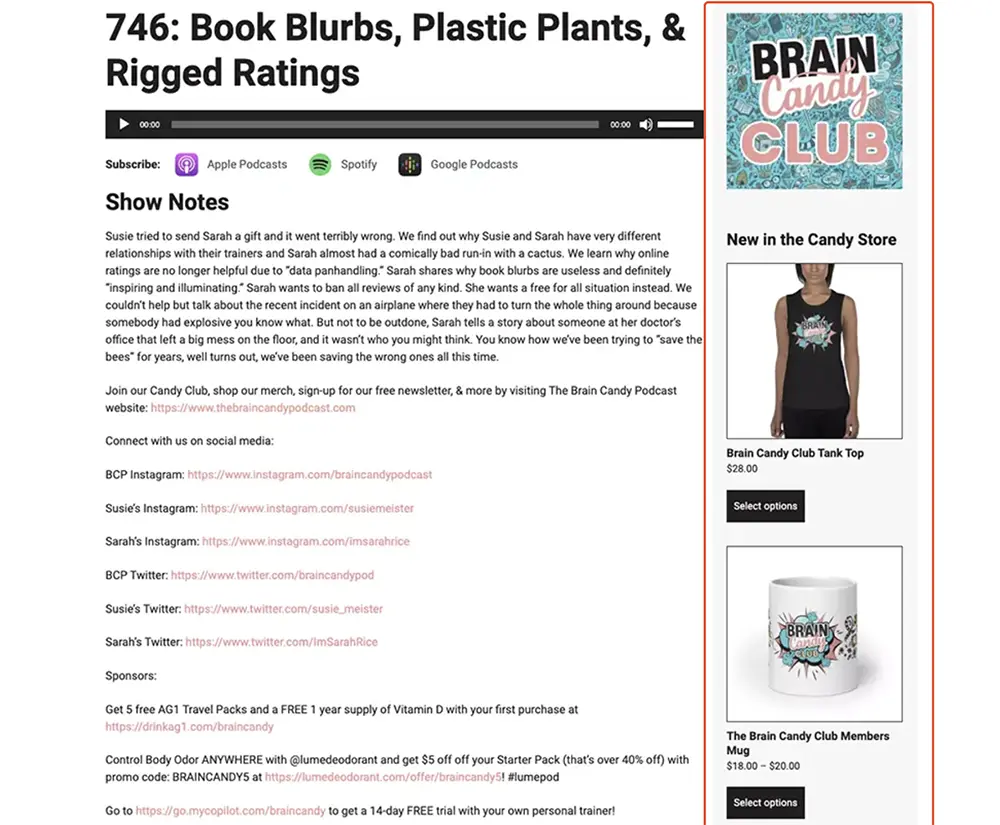
- Accepting Donations
If you’re just starting your podcast & have nothing to offer/sell yet, you can make your first dollars by accepting donations to support your podcast on your podcast show notes page. You can collect payments through a platform like Patreon or Buy me a coffee.

- Premium Memberships
You can sell paid subscriptions to your podcast in the show notes section and offer exclusive access to bonus like early access to episodes, member’s only Q&A and resources.
Make sure to include clear and concise calls to action in your show notes to encourage your listeners to engage with your monetization strategies.

5. Establish Your Brand
The format and structure of your show notes can become an integral part of your brand's identity. You can use unique sections in your show notes, storytelling elements or a specific show notes template to let listeners distinguish your podcast from the rest & create a memorable experience around your brand.
Show notes can also be used to promote other content or products within your brand's ecosystem, encouraging listeners to explore other aspects of your brand.
Check out these 17 inspiring podcast show notes examples to see how you can create a unique voice and brand identity through your podcast show notes.
How to Streamline Writing Podcast Show Notes:
Creating podcast notes on your own can be a time-consuming and tedious task. After investing hours in podcast production, your primary goal is to release your episode, not spend additional hours on writing and optimizing show notes. One effective solution to overcome this challenge is to outsource your podcast show notes to podcasting agencies, freelancers, or utilize an AI-powered podcast writer.
Using podcasting agency services
Podcasting agencies usually charge between $75 to $150 per episode for show notes, and they come equipped with a full team to accommodate your scaling needs. If necessary, agencies can also assist with research and provide end-to-end audio editing for your podcast. However, services offered by agencies tend to be the most expensive due to their comprehensive expertise and personalized assistance. They often require long-term commitments, which may not be the ideal option for aspiring podcasters.
Hiring a freelancer to write show notes
The main advantages of hiring freelancers over podcasting agencies is that you can expect to pay a lower price & request their service for a specific episode without long term commitments. You can find a wide range of freelancers on upwork/fiverr platforms. They typically charge between $10-$60 an episode based on delivery speed, length of your podcast & the freelancer’s experience.
If you choose to hire a freelancer to write your show notes, make sure you’re selecting the right person through interviews or test assignments, as freelancers highly vary in skill and experience.
Using an AI podcast writer
If you prefer to avoid the complexities and costs associated with hiring an agency or a freelancer, a practical alternative is to leverage AI for creating podcast show notes.
Thanks to recent advancements, you can now easily generate podcast show notes by simply uploading your podcast's audio file. AI software typically costs just a fraction of what you'd spend on hiring a freelancer, and it's even more budget-friendly compared to the services of a podcasting agency.
Advantages of using AI to write show notes
- Get instant ready-to-use publish show notes in a few minutes instead of hours
- High consistency in style and format when compared to outsourcing it to freelancers
- Accessible for all creators costing as little as $1 to $2 per episode, taking into account the average 30-minute podcast duration.
In addition to podcast show notes, you can also let AI write all the promotional content you would need to market your podcast on the internet & grow your audience, including blog posts, social media posts, newsletters, quotes & more.
How to generate podcast show notes & promotional content with AI
Here is how you can generate show notes, transcript with timestamps, social media posts, newsletter and other promotional content for your podcast with just a click of a button.
- Sign up for a free Podsqueeze account
- Click "Generate Content" button in your Dashboard
- Select your podcast name from the “search bar” or uplaod an audio or video file
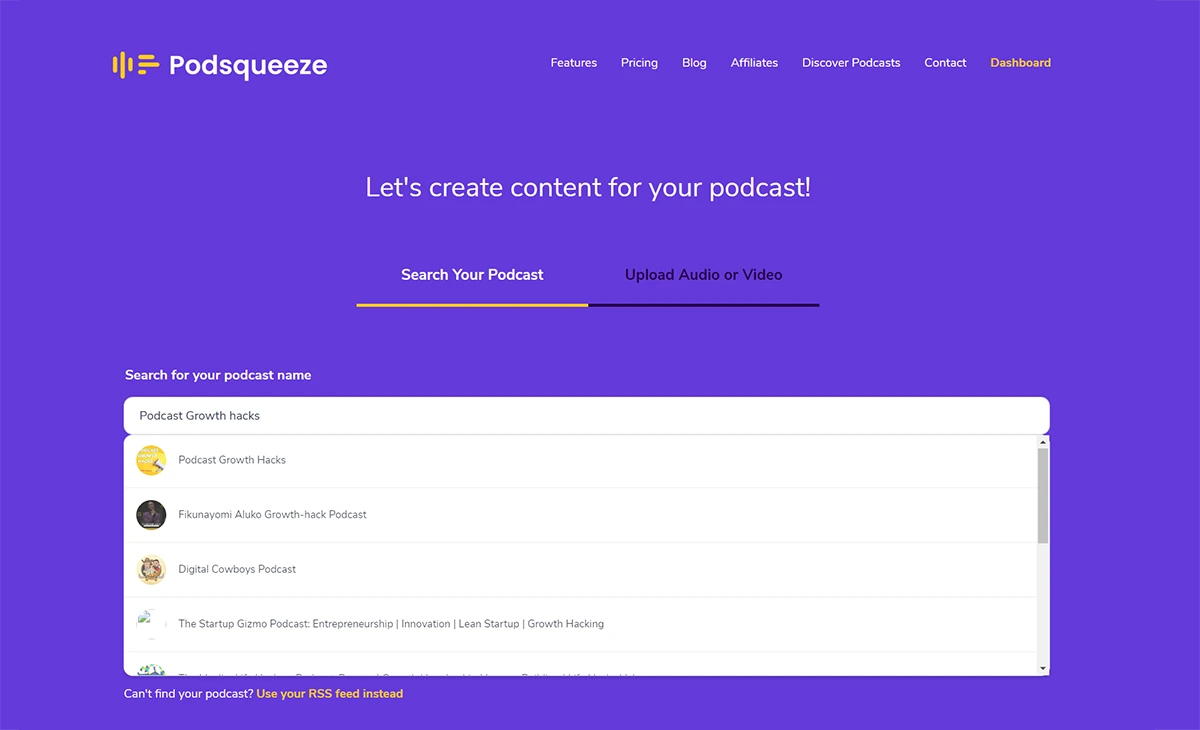
- Click the ”Generate Content” button & sit back /blog/podcast-show-notes-service/podsqueeze3.webp
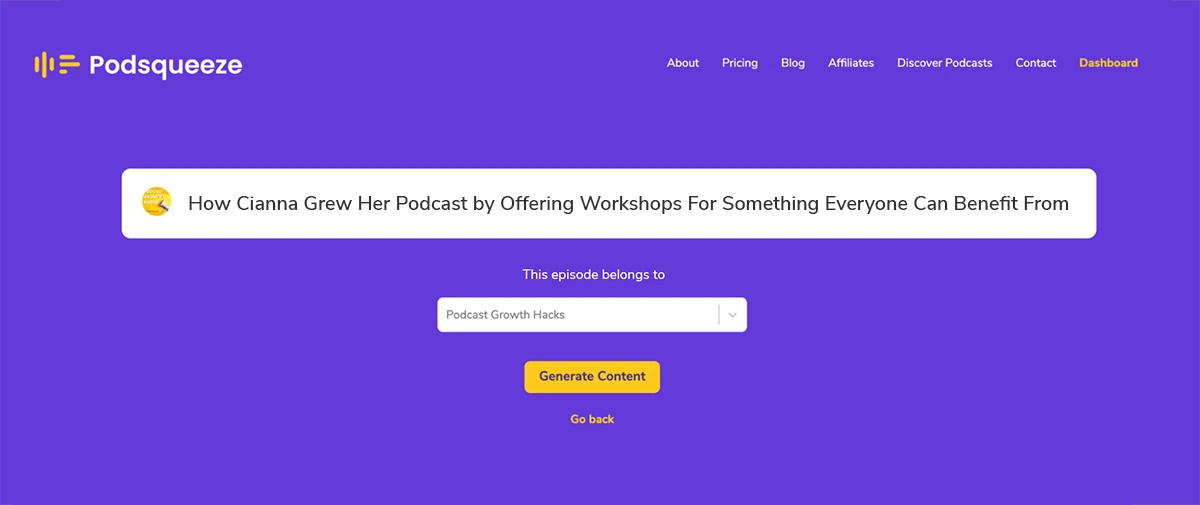
In 1 click, Podsqueeze will generate podcast show notes, transcripts and all the other promotional content that you need to publish and promote your podcast.
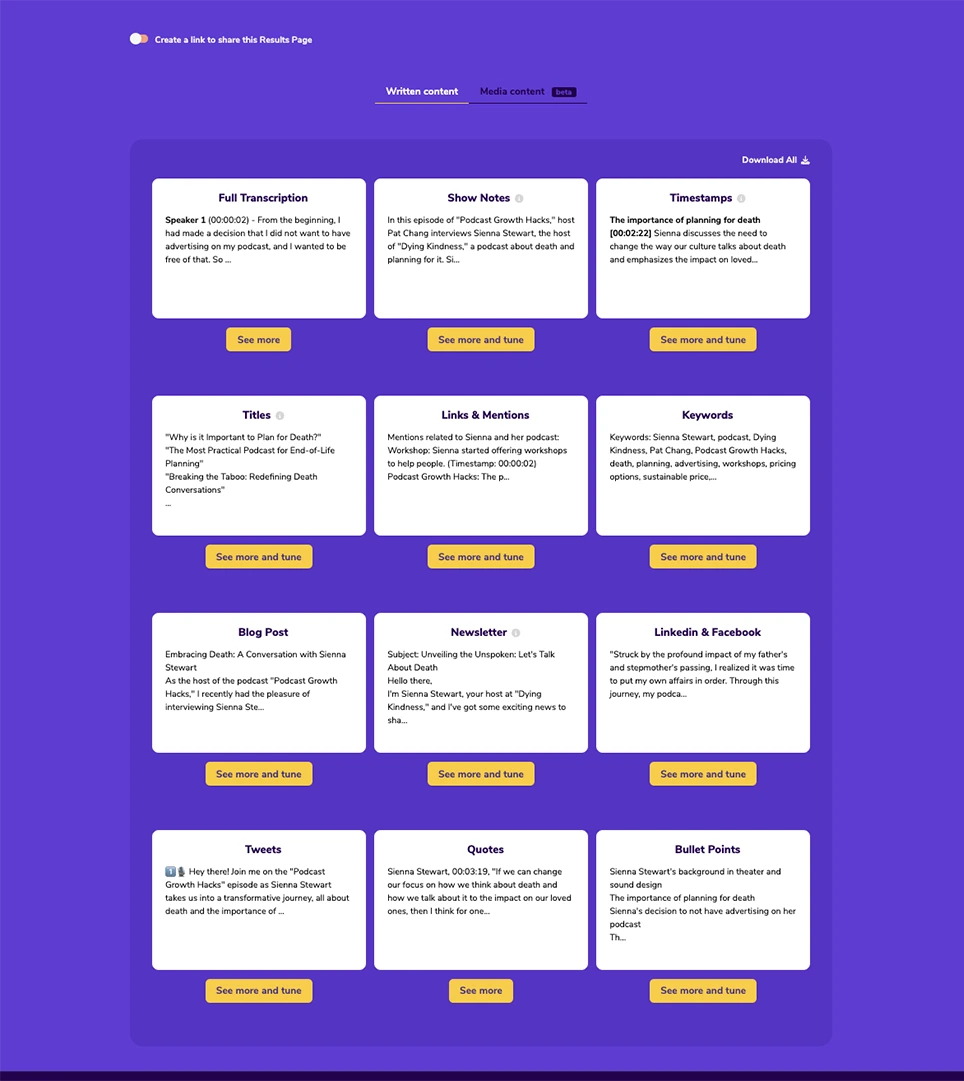
Here’s all the content Podsqueeze AI will generate from your podcast:
- The complete written transcript and SRT file for subtitles
- Podcast descriptions
- Episode chapters with timestamps
- Blog posts
- Title suggestions for your podcast episode
- Newsletter content to share with your email subscribers
- Social media content for LinkedIn posts, facebook posts & tweets to promote on social media
- A list of keywords mentioned on your podcast
- A list of brands mentioned in your podcast which you can tag on social media & get more - shares for your episode
- Quotes mentioned on your podcast by you and your guests to use on instagram/pinterest
- Bullet points of key takeaways from the podcast
- Clips with engaging segments from your podcast to share on social media
Podsqueeze provides a free plan that offers 50 minutes of podcast time per month, allowing you to try it out before committing to a paid plan, which starts at just $12 per month for 160 minutes of podcast time.
Repurpose your podcast content with AI